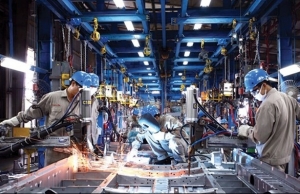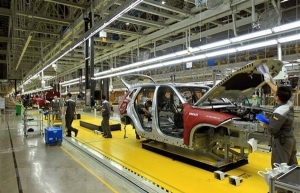An expert's view on interest rate movements
 |
| Senior economist Le Xuan Nghia |
What global factors currently suggest a move towards lower interest rates in the coming months?
In my view, the key factor is the US dollar continues to weaken.
Even though the US Federal Reserve (Fed) raised the base interest rate by a quarter of a percentage point in early May, meeting the target range of 5.0-5.25, it is likely there will be an interest rate cut later in the year. A number of factors support this stance, such as inflation in the US slowing, and the possibility of the labour market worsening in the next few months with increased lay-offs in several finance and technology fields.
Next is the possibility of widespread bankruptcies in the banking system, as seen in the recent cases of PacWest and Western Alliance.
Meanwhile, the US and EU economies face going into recession as the Russia-Ukraine conflict sees no signs of ending in the foreseeable future. This is also the very factor leading to a deep depreciation of the US dollar index, which might fall below 100, or even 96. The VND index, attached to the US dollar index, also faces depreciation, but this will be beneficial for Vietnam's exporters.
Inflation in Vietnam is mainly driven by external factors, particularly import activities, so this situation would alleviate inflation pressure, further supporting a move to lower interest rates
What’s about internal factors?
According to the General Statistics Office (GSO), total retail sales and services revenue rose by 11.5 per cent in April, similar to the previous month's growth.
However, in my view, service sector growth may fade in the next few months due to emerging dangers such as diminishing production, a stagnant real estate market, and high borrowing costs.
| Export hardships might last to at least the end of the second quarter amid a gloomy global economic outlook, resulting in a shortfall in new orders for Vietnam’s manufacturing sector. |
We saw the largest fall in three months in Vietnam’s exports this April, which were estimated at $27.54 billion, down 7.3 per cent compared to March, and 17.1 per cent compared to the same period in 2022.
More importantly, export hardships might last to at least the end of the second quarter amid a gloomy global economic outlook, resulting in a shortfall in new orders for Vietnam’s manufacturing sector.
Vietnam’s Purchasing Managers' Index (PMI) fell to 46.7 points in April from 47.7 points in March, showing a drop for the fifth time in six months, and the biggest fall since the start of the year.
Simultaneously, the value of Vietnam’s imports also continued to slide in April, reflecting falling demand for the importing of production materials. GSO figures indicate Vietnam’s import value shed 20.2 per cent on-year in April to about $25.2 billion.
The government has been accelerating public investment to stimulate economic growth as we see a weakening of equity and foreign direct investment (FDI). However, in the first four months of 2023, the values of disbursed public investment met just 19 per cent of the full-year's projection, meaning that without drastic measures, the target of disbursing more than $30.5 billion in public investment sources in 2023 will remain a long way off.
Since the start of the year, disbursed FDI volume has fallen 1.2 per cent on-year to $5.9 billion, and registered FDI volume also dropped sharply by 17.9 per cent on-year to $8.9 billion.
According to the State Bank of Vietnam's (SBV) figures, as of May 9, the credit volume of the entire economy was approximately $532 billion, up slightly by 2.69 per cent compared to the end of last year and up 9.56 per cent on-year.
Such figures, I believe, provide an unambiguous opportunity for interest rate reduction, and from now until the end of 2023, we should be taking bold steps to cut interest rates by at least 2 percentage points to make up for the spike in the latter part of last year.
Some analysts believe that accelerated public investment would revive the construction, production, and retail sectors. Do you agree?
Frankly speaking, at this point of time it is almost impossible to rely on external factors to rebound the economy, and the Vietnamese economy is also dealing with certain internal resources that it has not had to deal with previously.
We need to increase the volume of public investment to fuel domestic consumption.
Notably, there are supporting factors that may facilitate public initiatives to reach this year's target of $30.5 billion in total disbursement.
Firstly, by leveraging GDP growth during the 2016-2022 period, and maintaining a strict control on spending, Vietnam’s public debt ratio fell sharply from 51 per cent in late 2016, to 40 per cent late last year, far below the ceiling level of 60 per cent of GDP set by the government. This low level provides space for fiscal expansion to aid an economic rebound.
Second, inflation has lost heat in the past few months and the government may consider loosening fiscal policies to beef up those rebound efforts.
And third, the government has instructed the Ministry of Transport to finalise preparations to kick off the construction of three major motorways, as well as two belt roads, including Hanoi’s ring road 4 and Ho Chi Minh City’s ring road 3.
Such projects need to kick off before June 30. Once the construction of infrastructure projects has begun, it should create new resources and opportunities to accelerate urbanisation and development of industrial zones and new services, while simultaneously fuelling a real estate market revival.
 | IMF expert considers Vietnam bright spot in world economy Vietnam’s 8 per cent growth in 2022 was a bright spot of the region and the world, said Daniel Leigh, head of the World Economic Studies division in the International Monetary Fund (IMF)'s Research Department, which produces the World Economic Outlook (WEO). |
 | Vietnam showing better-than-average growth: Indian expert An Indian expert has highly valued Vietnam’s post-pandemic recovery in an article recently published on Moderndiplomacy.eu. |
 | Vietnam boasts high potential to become new global production hub: expert Vietnam has high potential to become a new production hub of the world in the context of the current transition of the supply chain, said Dr. Ho Quoc Tuan, a senior lecturer at Bristol University in the UK. |
 | Interest rate pressures to remain for the foreseeable High interest rates are causing major issues for businesses, hindering cash flow for production and investment. |
What the stars mean:
★ Poor ★ ★ Promising ★★★ Good ★★★★ Very good ★★★★★ Exceptional
Related Contents
Latest News
More News
- Private capital funds as cornerstone of IFC plans (February 20, 2026 | 14:38)
- Priorities for building credibility and momentum within Vietnamese IFCs (February 20, 2026 | 14:29)
- How Hong Kong can bridge critical financial centre gaps (February 20, 2026 | 14:22)
- All global experiences useful for Vietnam’s international financial hub (February 20, 2026 | 14:16)
- Raised ties reaffirm strategic trust (February 20, 2026 | 14:06)
- Sustained growth can translate into income gains (February 19, 2026 | 18:55)
- The vision to maintain a stable monetary policy (February 19, 2026 | 08:50)
- Banking sector faces data governance hurdles in AI transition (February 19, 2026 | 08:00)
- AI leading to shift in banking roles (February 18, 2026 | 19:54)
- Digital banking enters season of transformation (February 16, 2026 | 09:00)

 Tag:
Tag:

























 Mobile Version
Mobile Version